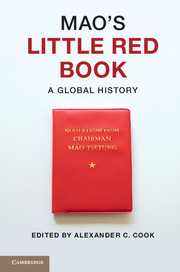Book contents
- Frontmatter
- Contents
- List of illustrations
- List of contributors
- Preface
- 1 Introduction
- 2 A single spark
- 3 Quotation songs
- 4 Mao quotations in factional battles and their afterlives
- 5 Translation and internationalism
- 6 Maoism in Tanzania
- 7 Empty symbol
- 8 The influence of Maoism in Peru
- 9 The book that bombed
- 10 Mao and the Albanians
- 11 Partisan legacies and anti-imperialist ambitions
- 12 Badge books and brand books
- 13 Principally contradiction
- 14 By the book
- 15 Conclusion
- Index
- References
2 - A single spark
Origins and spread of the Little Red Book in China
Published online by Cambridge University Press: 05 June 2014
- Frontmatter
- Contents
- List of illustrations
- List of contributors
- Preface
- 1 Introduction
- 2 A single spark
- 3 Quotation songs
- 4 Mao quotations in factional battles and their afterlives
- 5 Translation and internationalism
- 6 Maoism in Tanzania
- 7 Empty symbol
- 8 The influence of Maoism in Peru
- 9 The book that bombed
- 10 Mao and the Albanians
- 11 Partisan legacies and anti-imperialist ambitions
- 12 Badge books and brand books
- 13 Principally contradiction
- 14 By the book
- 15 Conclusion
- Index
- References
Summary
Comrade Mao Tse-tung is the greatest Marxist-Leninist of our era. He has inherited, defended and developed Marxism-Leninism with genius, creatively and comprehensively and has brought it to a higher and completely new stage.
Preface to the first English editionQuotations from Chairman Mao (Mao Zhuxi Yulu), known colloquially as the “red treasure book” (hong baoshu) in Chinese, was the most prominent icon of the Cultural Revolution. It was printed just over one billion times between 1966 and 1971, and in terms of print circulation ranks second only to the Bible. In China in the late 1960s it achieved supreme importance as the ultimate guide to political action and moral behavior. Several factors explain the Little Red Book’s enormous distribution numbers and its resonance with the Chinese populace. First, the compilation was not a novel phenomenon in Chinese culture; collected sayings dating back to the Confucian Analects frequently were employed to spread the wisdom of religious or secular sages. Second, communist claims to represent the absolute truth of a scientific worldview encouraged utmost reverence for works in the Marxist–Leninist canon. The ingenious physical format of the Quotations presents a third distinctive feature. Fourth, and without doubt the most important reason, was the political environment. As the former propaganda establishment came under heavy attack for having hampered the spread of Mao Zedong Thought, the new leadership raised production numbers as proof of revolutionary loyalty. Finally, in the absence of a functioning party bureaucracy, the decontextualized quotations could be employed for highly diverse aims, and supplied skillful orators with a means of empowerment in local power struggles. This chapter traces the fascinating and contingent history of the Little Red Book in China, from its traditional predecessors and its humble origins in the General Political Department of the People’s Liberation Army (PLA) in May 1964, through the high tide of its cult status during the Cultural Revolution, and finally on to its withdrawal from circulation in February 1979.
- Type
- Chapter
- Information
- Mao's Little Red BookA Global History, pp. 23 - 42Publisher: Cambridge University PressPrint publication year: 2014
References
- 5
- Cited by



